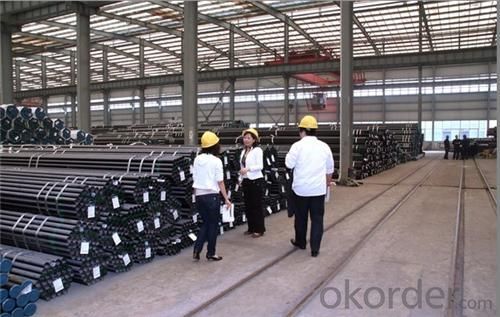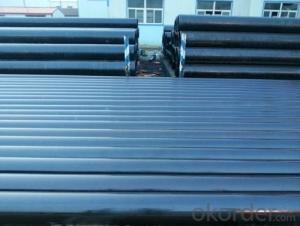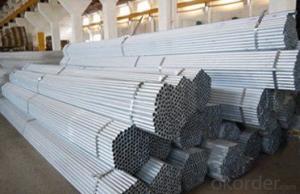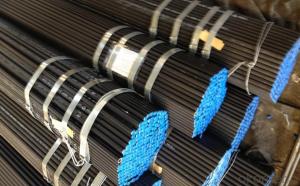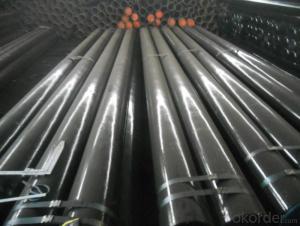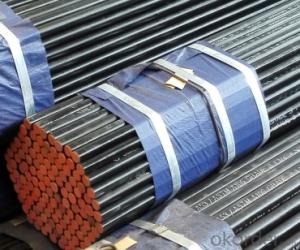Seamless Balck Pipe ASTM A106/API 5L/ASTM A53 GR B
- Loading Port:
- Tianjin
- Payment Terms:
- TT or LC
- Min Order Qty:
- 25 m.t.
- Supply Capability:
- 6000 m.t./month
OKorder Service Pledge
OKorder Financial Service
You Might Also Like
1、Structure of Seamless Balck Pipe ASTM A106/API 5L/ASTM A53 GR B:
Seamless pipe is formed by drawing a solid billet over a piercing rod to create the hollow shell. As the manufacturing process does not include any welding, seamless pipes are perceived to be stronger and more reliable. Historically seamless pipe was regarded as withstanding pressure better than other types, and was often more easily available than welded pipe.
2、Main Features of Seamless Balck Pipe ASTM A106/API 5L/ASTM A53 GR B:
• High manufacturing accuracy
• High strength
• Small inertia resistance
• Strong heat dissipation ability
• Good visual effect
• Reasonable price
3、Seamless Pipe ASTM A106/53 Specification:
Standard | GB, DIN, ASTM ASTM A106-2006, ASTM A53-2007 |
Grade | 10#-45#, 16Mn 10#, 20#, 45#, 16Mn |
Thickness | 8 - 33 mm |
Section Shape | Round |
Outer Diameter | 133 - 219 mm |
Place of Origin | Shandong, China (Mainland) |
Secondary Or Not | Non-secondary |
Application | Hydraulic Pipe |
Technique | Cold Drawn |
Certification | API |
Surface Treatment | factory state or painted black |
Special Pipe | API Pipe |
Alloy Or Not | Non-alloy |
Length | 5-12M |
Outer Diameter | 21.3-610mm |
Grade | 20#, 45#, Q345, API J55, API K55, API L80, API N80, API P110, A53B |
Standard | ASME, ASTM |
1) Material:20#(ASTM A 106/A53 GRB.API5LGRB,GB),45#,16Mn,10#.
2) Specification range:OD:21.3-610mm,WT:6-70mm,length:6-12m or according to the requirement of clients.
3) Excutive standards:GB,ASME API5L.ASTM A 106/A53,Despite of the above standards,we can also supply seamless steel pipe with standard of DIN,JIS,and so on,and also develop new products according to the requirements of our clients!
4) Surface:black lacquered,varnish coating or galvanized.
5) Ends:Beveled or square cut,plastic capped,painted.
6) Packing:bundles wrapped with strong steel strip,seaworthy packing.
4、Packaging & Delivery
Packaging Details: | seaworthy package,bundles wrapped with strong steel strip |
Delivery Detail: | 15-30days after received 30%TT |
5、FAQ of Seamless Balck Pipe ASTM A106/API 5L/ASTM A53 GR B:
①How is the quality of your products?
Our products are manufactured strictly according to national and internaional standard, and we take a test
on every pipe before delivered out. If you want see our quality certifications and all kinds of testing report, please just ask us for it.
Guaranteed: If products’ quality don’t accord to discription as we give or the promise before you place order, we promise 100% refund.
②How about price?
Yes, we are factory and be able to give you lowest price below market one, and we have a policy that “ for saving time and absolutely honest business attitude, we quote as lowest as possible for any customer, and discount can be given according to quantity”,if you like bargain and factory price is not low enough as you think, just don’t waste your time.Please trust the quotation we would give you, it is professional one.
③Why should you chose us?
Chose happens because of quality, then price, We can give you both.Additionally, we can also offer professional products inquiry, products knowledge train(for agents), smooth goods delivery, exellent customer solution proposals.Our service formula: good quality+good price+good service=customer’s trust
SGS test is available, customer inspection before shipping is welcome, third party inspection is no problem.
6、Seamless Pipe ASTM A106/53 Images:
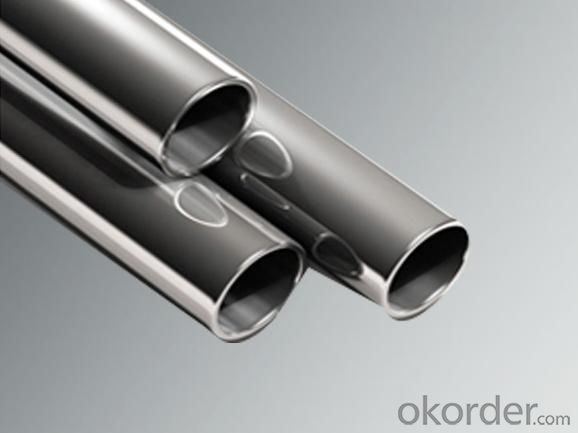
- Q: How are steel pipes used in the manufacturing sector?
- Steel pipes are used in the manufacturing sector for various purposes such as transporting fluids and gases, supplying water, and carrying out structural applications. They are commonly used in industries like oil and gas, construction, automotive, and aerospace for their durability, strength, and resistance to corrosion. Additionally, steel pipes are crucial in the manufacturing of machinery, equipment, and infrastructure, making them essential components in many manufacturing processes.
- Q: How are steel pipes used in the construction of telecommunications towers?
- Steel pipes are commonly used in the construction of telecommunications towers as they provide a strong and durable framework for supporting the tower structure. These pipes are used to create the main mast or tower structure, providing stability and strength to withstand various weather conditions. Additionally, steel pipes are often used for mounting antennas and other equipment on the tower, ensuring secure installation and efficient signal transmission.
- Q: Can steel pipes be used for underground cooling systems?
- Yes, steel pipes can be used for underground cooling systems. Steel pipes are often preferred for underground applications due to their strength, durability, and resistance to corrosion. They can effectively withstand the pressure and temperature requirements of cooling systems and can be used for transferring chilled water or other coolants underground.
- Q: How long do steel pipes typically last?
- Steel pipes typically last for several decades to over a century, depending on factors such as the quality of the steel, environmental conditions, and maintenance practices.
- Q: How are steel pipes insulated to prevent heat gain?
- Steel pipes are insulated to prevent heat gain by applying a layer of thermal insulation material around them. This insulation material acts as a barrier, preventing the transfer of heat from the surrounding environment to the steel pipes. Additionally, the insulation is often covered with a protective outer layer to enhance its durability and resistance to external factors.
- Q: What is the maximum temperature and pressure that steel pipes can withstand?
- The maximum temperature and pressure that steel pipes can withstand vary depending on the specific grade and type of steel being used. However, in general, steel pipes can withstand high temperatures and pressures due to their strong and durable nature. For high-temperature applications, such as in steam or heat transfer systems, steel pipes can typically withstand temperatures up to 1000 degrees Celsius (1832 degrees Fahrenheit) or even higher. It is important to note that the specific temperature limit may vary depending on the alloy composition and heat treatment of the steel. Regarding pressure, steel pipes are known for their excellent strength and resistance to internal and external pressure. The maximum pressure that steel pipes can withstand will depend on factors such as the pipe diameter, wall thickness, and material strength. In industrial applications, steel pipes can withstand pressures ranging from a few hundred psi (pounds per square inch) to several thousand psi. To ensure the safe operation of steel pipes under high temperatures and pressures, it is crucial to follow industry standards and guidelines, as well as perform regular inspections and maintenance. Consulting with engineers and professionals experienced in steel pipe systems can provide more specific information regarding the maximum temperature and pressure limits for a particular steel pipe application.
- Q: How do steel pipes handle seismic expansion joints?
- Steel pipes handle seismic expansion joints by incorporating flexible components, such as bellows or expansion joints, which can absorb the movement caused by seismic activity. These flexible components allow the pipes to expand and contract without causing stress or damage to the system, ensuring the integrity and longevity of the pipeline during seismic events.
- Q: What are the different grades of steel used for pipes?
- Pipes are manufactured using various grades of steel, each possessing unique properties and applications. Some commonly utilized grades include: 1. Carbon Steel: This type of steel is widely employed in pipe manufacturing, particularly for low-pressure purposes. It contains a low carbon content, typically less than 0.30%, facilitating easy welding and forming. Carbon steel pipes are known for their durability and cost-effectiveness, making them suitable for diverse industries. 2. Stainless Steel: Stainless steel pipes are renowned for their corrosion resistance and high strength. They consist of an alloy of iron and chromium, with additional elements like nickel and molybdenum enhancing their properties. These pipes find extensive usage in industries such as chemical processing, food production, and oil and gas, where corrosion resistance is vital. 3. Alloy Steel: Alloy steel pipes are created by incorporating elements like manganese, chromium, or nickel into carbon steel. This enhances their strength, hardness, and wear resistance, rendering them appropriate for high-pressure and high-temperature applications. Industries such as power generation, petrochemical, and aerospace frequently employ alloy steel pipes. 4. Duplex Steel: Duplex steel represents a type of stainless steel that combines austenite and ferrite phases. This results in a material possessing exceptional strength, corrosion resistance, and toughness. Duplex steel pipes are commonly utilized in offshore oil and gas platforms, as well as in chemical and petrochemical industries. 5. Low-Temperature Steel: Low-temperature steel is specifically designed to withstand extremely cold temperatures without becoming brittle. These pipes find significant use in industries such as cryogenic storage, LNG transportation, and refrigeration. Choosing the appropriate grade of steel is crucial to ensure optimal pipe performance and longevity. Factors such as temperature, pressure, corrosion resistance, and cost should be taken into account when selecting the steel grade for pipes.
- Q: Can steel pipes be used for geothermal systems?
- Yes, steel pipes can be used for geothermal systems. Steel is a commonly used material for geothermal applications due to its durability, strength, and resistance to corrosion. It can effectively withstand the high temperatures and pressures associated with geothermal systems, making it a suitable choice for transporting the geothermal fluid to and from the heat source.
- Q: Galvanized steel pipe in addition to good rust resistance, what are the advantages?
- It has the characteristics of corrosion resistance and wear resistance, so it can be used longer;
Send your message to us
Seamless Balck Pipe ASTM A106/API 5L/ASTM A53 GR B
- Loading Port:
- Tianjin
- Payment Terms:
- TT or LC
- Min Order Qty:
- 25 m.t.
- Supply Capability:
- 6000 m.t./month
OKorder Service Pledge
OKorder Financial Service
Similar products
Hot products
Hot Searches
Related keywords


